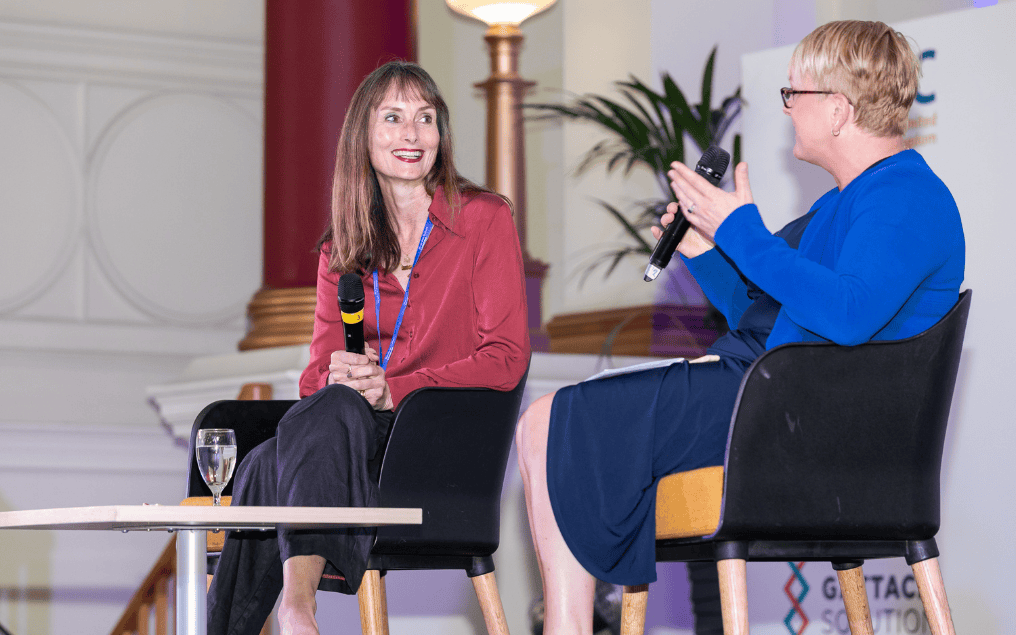Through case studies and insights shared by award-winning practitioners and global thought leaders at Business Culture Connected, we highlight some common themes and actions for how to successfully build an exceptional culture in order to deliver productivity & performance. We previously shared Part I which examines four practical suggestions. From the diverse range of issues impacting culture, we now share further actionable insights based on approaches which are supporting better working lives and accelerating business performance in organisations today.
1. It’s all about values
Values, even more than purpose, were a key focus. Speakers highlighted the foundational role of core values in shaping culture, guiding behaviour and influencing strategic decisions. Emphasising values ensures that actions align with an ethical framework and cultural identity, impacting both internal operations and external perceptions. Rebekah Heaven of Standard Chartered explained its core values – ‘do the right thing,’ ‘better together,’ and ‘never settle’ – were crowdsourced from employees and drive business operations and community engagements. Lewes FC’s equal support for men’s and women’s teams exemplifies fairness and equality values, while British Heart Foundation’s Kerry Smith and Real Fundraising’s Liam McEntegart noted that deeply embedded values guide behaviour and decisions. Real Fundraising aligns actions with values like respect, ethics, activism and love, crucial particularly in managing remote workers, says McEntegart. These values are not only a foundation but actively shape daily interactions and operational decisions
Tips:
● Embed values in recruitment and retention strategies, clearly communicating them during job descriptions, interviews and onboarding. Highlight values in recruitment campaigns and seek candidates whose personal values align.
● Integrate core values into decision-making with a values checklist for evaluating options during meetings and crises. Train leaders to apply these values consistently.
● Align corporate and personal values, as Caseware did with rebranding to ensure that internal corporate values resonate personally with employees.
● Use data to track alignment with values and their impact on outcomes like customer satisfaction and financial success. Remember, values affect internal stakeholders and shape interactions with customers, partners and the community, influencing brand reputation and market positioning.
2. Trust is a behaviour
Trust is pivotal in organisational life, from leadership to team dynamics and stakeholder relationships. It underpins effective communication, collaboration and overall cultural integrity. JJ Thakkar from TE Connectivity noted trust’s increased importance post-pandemic, emphasising the need to rebuild trust and discuss the employee value proposition. BT’s Laura Murphy, quoting Simon Sinek’s “trust is a behaviour,” highlighted co-creating vision as a way to build trust.
Tips:
● Ensure consistency and integrity in actions and policies, especially during crises, by applying company values consistently.
● Communicate the rationale behind decisions regularly to maintain transparency and trust.
● Create platforms for open dialogue, like town halls and feedback mechanisms. Emma Woodhead White from Kin&Co shared a story of a CEO who posted three current things they were working on on their office door, inviting feedback.
● Encourage managers to actively listen and respond to employee concerns. Ashley Wickham-Byrne of Pernod Ricard started collecting feedback with simple suggestion boxes placed around the office and warehouse.
3. Coaching: the glue holding culture together
Coaching, especially democratising access to it, was emphasised as essential for reinforcing culture and supporting employee development and adaptability. At Transport for London it helped stabilise culture amid a drop in ridership and competition with remote work during the pandemic. Liz Pannaman explained its group coaching programme structured around its People Leader framework focused on practical implementation and accountability. Leaders met regularly to discuss challenges and progress, fostering ongoing interaction and support. Professor Sarah Niblock of EMCC highlighted how coaching and mentoring kept NHS teams aligned and fostered a sense of belonging during the pandemic.
Tips:
● Establish group coaching sessions to enhance collaboration and leadership skills, as demonstrated by TfL. This can develop quality conversations, empathetic leadership and adaptability.
● Align coaching programs with the organisation’s core values to reinforce cultural norms and expectations.
● Design bespoke coaching programmes tailored to the unique needs of the business and its employees, avoiding one-size-fits-all solutions.
● Promote continuous learning and accountability through structured coaching, with regular meetings to discuss challenges.
4. Play and fun – the new approach to embedding culture change
Playful environments encourage creativity and innovation by reducing fear of failure and promoting risk-taking and openness to change. This dynamic approach contrasts with traditional methods of managing culture change, fostering greater employee satisfaction and innovation. At The Whisky Exchange conviviality is a core value, so there is a culture of people enjoying being together and having fun globally, explained Ashley Wickham-Byrne. Caseware incorporates fun and surprise into daily activities to maintain high employee engagement. Meanwhile logistics firm DFDS uses gamification to embed DE&I, with half-day training programmes featuring a customised board game to educate employees in an engaging and interactive way. This method helps break down complex legal and social concepts into understandable and relatable scenarios, facilitating better understanding and retention, said DFDS’ Donna Craig.
Tips:
● Implement gamified training sessions and interactive learning experiences with quizzes, leaderboards and rewards to enhance engagement and information retention.
● Tailor gamified training content to various organisational groups, ensuring relevance and impact across all levels.
● Ensure psychological safety in ‘fun’ activities, allowing people to express themselves without fear. DFDS uses games and discussions under Chatham House rules for comfort with sensitive topics.
● Introduce playful elements into everyday tasks with friendly competitions, challenges or themed workdays. Celebrate small wins with fun activities or social events.
Read Part I: Embrace adaptive human-centric orchestration to foster innovation and agility, Remember purpose is not just about the employee, Technology needs to move beyond merely being a ‘faster horse’, Ditch the mono-culture and embrace more diversity.

